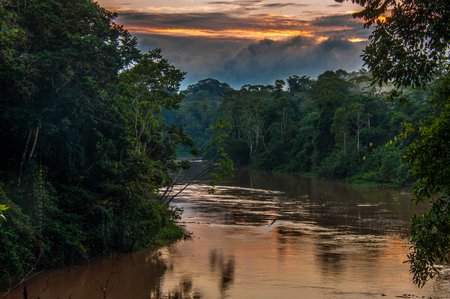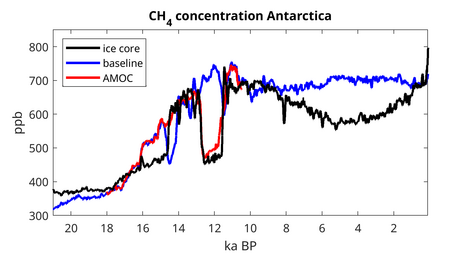Tropical wetlands drove methane changes since the last glacial

Methane (CH4) is a greenhouse gas that has a global warming potential per emitted molecule about 28 times greater than carbon dioxide. For the last 800000 years its atmospheric concentration can be reconstructed from ice cores, and the concentration was always higher for the warm interglacial periods than for the cold glacial periods. Between the last glacial maximum (LGM, ca. 20000 years ago) and the preindustrial state (PI, about 200 years ago), the concentration doubled from ca. 350 parts per billion (ppb) to about 700 ppb, and it has more than doubled again from the industrial revolution to the present level of 1900 ppb. The latter increase is due to human activities – mainly the use of fossil fuels, but also agriculture and waste facilities. The former increase, however, occurred before the Anthropocene. What drove this natural increase in the atmospheric CH4 concentration? And what drove the massive swings in atmospheric methane during this period, with the methane concentration going down and up by more than 20% over the course of a few years?
The authors found that the long-term increase in atmospheric methane originates mainly in tropical wetlands, with the Amazon and Indonesia playing very prominent roles. Furthermore, they could show that the large swings in atmospheric methane during the Bølling-Allerød (14.7 – 12.9 ka BP) and Younger Dryas (12.9 – 11.7 ka BP) periods were likely caused by circulation changes in the Atlantic Ocean, as an induced change in the Atlantic Meridional Overturning Circulation displays a signature extremely similar to the methane changes recorded in ice cores.

Kleinen and co-authors also showed that in glacial climate, with sea levels up to 130m lower than at present, about a third of the methane emissions originated from locations that are below the present-day sea level. Finally, they were able to show that the atmospheric lifetime of methane varied between 10.4 and 12 years, a variation considerable smaller than had been hypothesized before.
In a previous study, Kleinen and co-authors had applied the same modeling system to a number of future warming scenarios and found much stronger increases in methane than had been assumed previously. The validity of this finding is confirmed by demonstrating that the results compare well against methane reconstructions from ice core data.
Dr. Thomas Kleinen: “The good agreement of our model results for the deglaciation with ice core reconstructions boosts our confidence in our model results for future climate.”
The research is part of the BMBF-funded Palmod project, where researchers from several German research institutes aim to model the entire last glacial cycle employing state-of-the-art Earth System Models.
Original publication
Kleinen, T., Gromov, S., Steil, B., and Brovkin, V.: Atmospheric methane since the last glacial maximum was driven by wetland sources, Clim. Past, 19, 1081–1099, https://doi.org/10.5194/cp-19-1081-2023, 2023.
Kontakt
Dr. Thomas Kleinen
Max Planck Institute for Meteorology
phone: +49 (0) 40 41173 140
thomas.kleinen@mpimet.mpg.de
Prof. Victor Brovkin
Max Planck Institute for Meteorology
phone: +49 (0) 40 41173 339
victor.brovkin@mpimet.mpg.de
Dr. Sergey Gromov
Max Planck Institute for Chemistry
phone: +49 (0) 6131 305 4615
sergey.gromov@mpic.de
